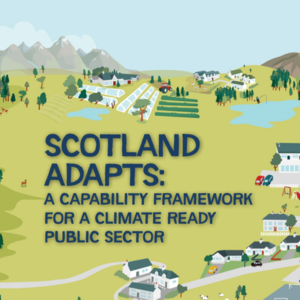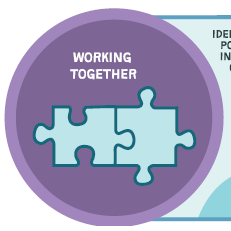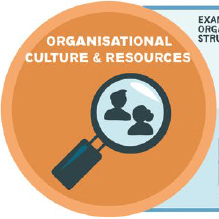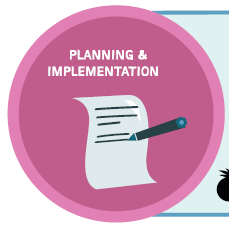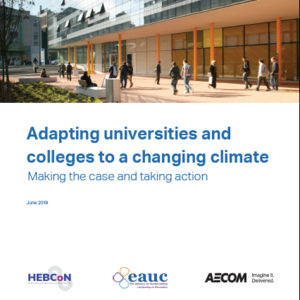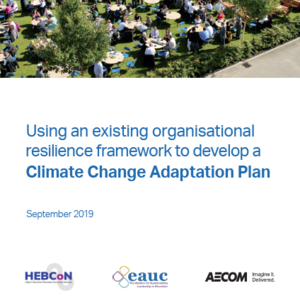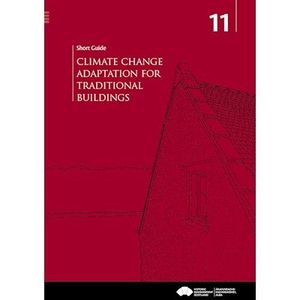Scottish Climate Change Adaptation Resources
Adaptation of your institution's campus(es) and systems to the effects of climate change is vital to ensure organisational resilience.
Find some key resources to support your adaption journey from EAUC, Adaptation Scotland, Historic Environment Scotland and the Scottish Government below.
Additional adaptation resources and case studies relevant to the further and higher education sector in the UK can be found on the Sustainability Exchange.
If you are a member of EAUC, you might wish to join the UK and Ireland Managing Climate Risks to Colleges and Universities Community of Practice. This group is convened by Dr Robert Wilby, a hydro-climatologist and Professor of Hydroclimatic Modelling in the Department of Geography and Environment at Loughborough University.
The Adaptation Capability Framework is the basis of Adaptation Scotland’s guidance for the public sector. The Framework aims to promote a holistic approach to adaptation. Based on local and international experience, they have developed a ‘capability-maturity’ approach that draws upon the characteristics of well-adapting organisations. These are clustered into four adaptation capabilities for organisations, which can be developed by completing recommended tasks as you progress through four maturity stages.
No organisation can adapt alone, by working together we can do more to achieve shared adaptation outcomes. By developing this capability you will forge connections with key partners to share ideas and find opportunities to collaborate. During this webinar Elizabeth Vander Meer from the University of Edinburgh and Tara Murray from Aberdeenshire Council give first hand accounts of how they are approaching the ‘Working together’ capability to make their respective organisations more resilient to a changing climate.
To make progress with adaptation, it will need to fit with your organisational culture and resources. By developing this capability, you will find ways to align adaptation activities with your organisation’s priorities. Over time they will become mainstreamed into plans, policies and procedures - part of business as usual for your organisation. During this webinar Dr. Roddy Yarr from Strathclyde University and Alan Gale together with Isla McCaskie from Forestry and Land Scotland share their experiences and insights on making progress with adaptation and finding the right fit for it in their organisational culture and resources.
Adaptation is a long-term challenge that requires strategic planning and implementation to achieve outcomes. By developing this capability you will set appraised options into an adaptation strategy and action plan, adopting an approach that maintains flexibility and seeks pathways for an adaptation transition. During this webinar Mairi Davies from Historic Environment Scotland and Victoria Barby from the Scottish Parliament give first hand accounts of how they are approaching the ‘Planning & Implementation’ capability from the Adaptation Capability Framework to make their respective organisations more resilient to a changing climate.
Developed by a Working Group of FHE sustainability and risk professionals, led by EAUC and HEBCoN (the Higher Education Business Continuity Network) with the support of adaptation specialists from AECOM, two Guides published in summer 2019 highlight why, and how, to effectively embed considerations of climate change risk within your existing risk and business continuity procedures. Additionally, case studies and example Adaptation Strategies and other relevant documents from universities and colleges around the UK are collated to provide further support.
This is the main guide produced through a project on climate change adaptation run collaboratively by EAUC and the Higher Education Business Continuity Network (HEBCoN), with the support of AECOM. The guide provides a range of support, from an initial self-assessment on climate readiness and an example Elevator Pitch to use to communicate the need for investment in adaptation, to climate projections, examples of risks, opportunities and potential adaptation actions, and a compilation of resources to support action in your institution.
This Guide provides step-by-step advice on running your own Business Impact Analysis workshops to evaluate the risks presented by climate change to key organisational functions, and deciding on the actions required to reduce any significant risks. The document presents a seven step process to develop a Climate Change Adaptation Plan (CCAP). Each step outlines key related processes that may already exist within your FHEI. These processes may not exactly match your FHEI’s approach, but may be adapted to align with your institution’s current strategy.
Some traditional buildings may become less able to cope with changing weather patterns caused by climate change. This Short Guide describes the key aspects of the external envelope of a traditional building that provide protection against the elements, and considers how these can be improved or adapted to increase a building’s resilience to extreme weather events. It also considers the internal environment within older buildings, and how this can be managed to cope with changing environmental conditions.
On 1 October 2021, chief executives, directors and other senior leaders from 70 organisations participated in the Scottish Government-hosted National Climate Resilience Summit. This Summit was an opportunity to raise collective ambitions for an inclusive, resilient, net zero Scotland and demonstrate support for a global deal on adaptation at COP26 in Glasgow.

